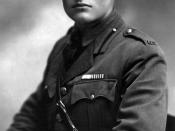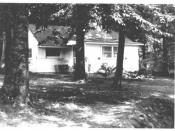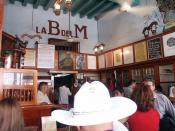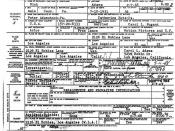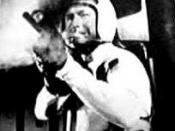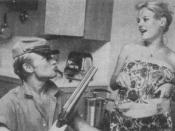Big Two Hearted River Ernest Hemmingway The Big Two Hearted River, by Ernest Hemmingway, is a short story about a man on a fishing trip. This same man was trying to escape his memories of war. Nick, a former soldier on the Italian front, still was deeply troubled about the war even though he had left the battlefields. Nick went on a fishing trip to a place where he and his father once fished. He was a skillful and experienced fisherman. It was a physically demanding, daylong hike deep into the wilderness of northern Michigan. On his hike he found a burned-out town and landscape, which was a result of the fire, but he noted the river seemed unaffected.
The predominant effect of the story was that the psychological stress of war on a person persists long after war is over. Nick had fought on the Italian frontier and was wounded.
Even though he had left the battle zone, he still had memories of battle. His actual wound had healed, but psychologically he had not. Nick did not want to think about this painful memory because he did not want to go back. Ernest Hemmingway's main theme was about an individual testing oneself. Nick Adams, the individual in this story, was struggling against the psychological effects that he faced. He went into the wilderness to exert himself, and this physical challenge kept his mind off of his wartime memories. He could have stayed and fished on the bridge where he saw plenty of fish, but instead he wanted the physical exertion, so he climbed the hills and hiked deeper into the woods. The author achieved this predominant effect, by his use of imagery and symbolism. Physically Nick was out of battle and away from war, but mentally the war still affected him. "These were just ordinary hoppers, but all a sooty black in color."àEven though these grasshoppers were not in the actual fire, they had been hopping around the charred landscape, which caused them to appear black. This symbolized that even though the war was over, the effects of war were far-reaching and long lasting. The war had ended, but the effects of war lingered. The ""æthe burned over stretch of hillside, where he had expected to find the scattered houses of the town"æ"àsymbolized the destruction of war. "Nick sat down against the charred stump and smoked a cigarette."àEverything in the town had been affected; the same way that the war affected everyone it encountered. The "burned over town"àhad been destroyed by fire, like war had destroyed land and also people. The fire that destroyed the town represented the war and the damage that it caused. The charred remains represented the devastation of war. Nick alluded to his reaction to the war when he spoke about the memory of his friend, Hopkins, making coffee. "The coffee was bitter. Nick laughed. It made a good ending to the story. His mind was starting to work. He knew he could choke it because he was tired enough."àNick could "choke out"àthe memories and this was why he chose physical exertion because it made him tired and he did not have to think.
I thought this story was very interesting because of the vivid descriptions. The author seemed to bring the reader to the place. The symbolism in the story was important, but it was also easily understood. By this use of symbolism the story had a stronger meaning. His simplistic writing style made the story easy to read and helped the reader understand the author's perspective on the affects of war. Ernest Hemmingway used to take hikes with his father, as did the character in his story. Ironically, Nick took a walk to forget about the memories of war, but Ernest Hemmingway used to take these walks as recreational activities with his father. This gave him the ability to write descriptive prose. I liked this story because I enjoyed Ernest Hemmingway's writing style. He seemed clearer than Emerson and Thoreau, but he still made his point.
Jessica Peterson April 20, 2000 Period 7/8 In Another Country Ernest Hemmingway In Another Country, by Ernest Hemmingway, is a story about the mental battle of four wounded soldiers, and their difficulties of coming to grips with their crippling injuries. The four soldiers in the story were wounded beyond repair. They could not look beyond their sense of loss. By the end of the story, the only thing these men seemed to share was their sense of loss. They could not even share this with each other because of their circumstances in the war and their different backgrounds. The four men underwent physical therapy and attempted to recover from their injuries, but due to their sense of loss they were not very optimistic.
The predominant effect of this story was trying to live with a sense of loss and the isolation that this brings. All four men had a major injury. They had something in common, but they were unable to share in their sense of loss. It dragged each man down. These men were also wounded so they were isolated from their fighting units. Due to this sense of loss, these men had a hard time seeing that things could get better. This is why the people at the hospital and the wounded soldiers carried and hung pictures on the walls to show them that recovering from their loss was possible. It was used for encouragement. The author achieved the predominant effect through his use of symbolism. The men were isolated from their previous lives. The injured soldiers felt isolated because of their loss, and no one understood, because getting wounded "was really an accident."àThey were isolated from the outside world, ""æwe felt held together by there being something that had happened that they, the people who disliked us, did not understand."àThe townspeople did not understand the loss that these men had suffered and had to deal with. The soldier from the United States was isolated because he was "in another country"àand the language and culture were different. He also felt that he was an outsider because of the way he received his wound, "by accident."àHe was isolated from the other soldiers because he was in the hospital. "The hospital was very old and very beautiful, and you entered through a gate and walked across a courtyard and out of a gate on the other side. There were usually a funeral starting from the courtyard."àThe hospital was even isolated from the public. The author used symbolism when he wrote about the men walking across the courtyard. They were not able to go home and not able to rejoin their fighting units because they were crippled, this symbolized them being "shut out."àThe sense of loss of the major's wife was symbolic once again of isolation. He was now permanently isolated from his wife. He had postponed marrying her until he knew that he would not have to go back and fight. His wife's death was symbolic in that he waited to marry her when he thought it was safe, but then something beyond his control took her life, pneumonia. This was another loss that the man suffered. "If he is to lose everything, he should not place himself in a position to lose that"æHe should find things he cannot lose."àHe gave this advice because he was overcome by his sense of loss, and he warned the soldier to avoid that feeling.
Ernest Hemmingway's simplistic writing style conveyed the strong message of the effects of loss and isolation on a person. The first time that read this story I did not understand it, but after reading it a few times I understood the story's significance. The title sums up the story because of the sense of isolation one feels when outside familiar surroundings. Ernest Hemmingway used very fluid writing in this story, but even though it was easy to read it conveyed a strong message. Ernest Hemmingway made the emotions and thoughts of the characters evident. This story was another example of an individual's struggle against himself. It was simple and realistic, but at the same time captured an issue that is difficult to describe because of its' complexity.
